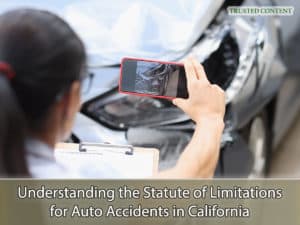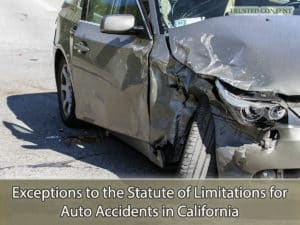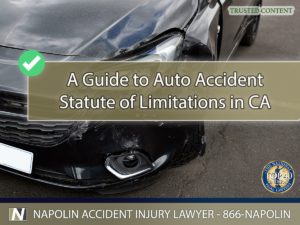A Guide to Auto Accident Statute of Limitations in California
In the aftermath of an auto accident, understanding your legal rights and the timeframe for action is paramount. The statute of limitations in California sets strict deadlines for filing a lawsuit for damages or injuries sustained in a car accident. This guide aims to demystify these legal timelines, ensuring that individuals involved in auto accidents are well-informed about their rights to compensation. Missing the statute of limitations can bar you from seeking justice and financial recovery for your losses, making it essential to act promptly and knowledgeably.

Understanding the Statute of Limitations for Auto Accidents in California
Understanding the Statute of Limitations for Auto Accidents in California
The statute of limitations is a critical legal principle that dictates the maximum time after an event within which legal proceedings must be initiated. In the context of auto accidents in California, these time limits are established to ensure timely and efficient resolution of disputes. They also serve to protect potential defendants from facing indefinite threat of legal action. For victims of auto accidents, these statutes necessitate prompt action to secure their legal rights and potential compensation for injuries and damages incurred.
Detailed Breakdown of Time Limits for Claims
California’s legal framework provides specific time limits for filing different types of claims related to auto accidents. For personal injury claims, victims have a two-year window from the date of the accident to initiate legal action. This period is designed to give individuals sufficient time to understand the full extent of their injuries and to seek appropriate legal counsel. Property damage claims, on the other hand, have a three-year statute of limitations, allowing for a longer period to assess and address the damages to vehicles and other property. These distinctions underscore the importance of recognizing the nature of your claim and acting within the legal deadlines.
Special Considerations for Government Vehicle Accidents
Accidents involving government vehicles are subject to different rules, reflecting the unique legal status of government entities. In these cases, the statute of limitations for personal injury claims is significantly shorter, at just six months. Property damage claims involving government vehicles must also be filed within one year. This expedited timeline necessitates immediate action from victims to ensure their claims are not dismissed due to procedural oversights. Understanding these exceptions is crucial for anyone involved in an accident with a government vehicle, as navigating these claims requires a nuanced understanding of California law.

Exceptions to the Statute of Limitations for Auto Accidents in California
Exceptions to the Statute of Limitations for Auto Accidents in California
California law recognizes several exceptions that can toll, or pause, the statute of limitations, extending the time victims have to file a lawsuit. These exceptions include situations where the injured party is a minor, the claimant has a mental incapacity, the defendant is incarcerated, or the defendant is out of the state. For minors, the statute does not begin to run until they reach the age of 18, providing them with time to pursue a claim as adults. Similarly, for individuals who are mentally incapacitated or for defendants who are not present in the state, the law provides mechanisms to ensure that justice can be pursued once these tolling conditions are resolved.
Preparing to File a Car Accident Claim
Filing a car accident claim in California requires meticulous preparation and gathering of evidence. Essential documents include detailed photographs of the accident scene, comprehensive medical records and bills, witness statements, relevant insurance policies, and official police reports. This evidence forms the backbone of your claim, supporting your account of the accident and substantiating your financial and emotional losses. Early and thorough collection of this evidence is instrumental in building a strong legal case, ensuring that all aspects of the accident and its impacts are well-documented.
Optimal Timing for Filing a Car Accident Claim
While legal deadlines dictate the latest point by which you must file your claim, determining the optimal time to take legal action requires strategic consideration. Ideally, you should wait until the full extent of your injuries is known and you have received a comprehensive assessment of your future medical needs and costs. This approach ensures that any legal claim or settlement negotiation accurately reflects the true cost of your injuries, including long-term care and rehabilitation. Consulting with a knowledgeable attorney can help you navigate these considerations, ensuring that your claim is filed at a time that maximizes your chances of receiving full and fair compensation.
The Role of a Car Accident Lawyer
Securing the services of a competent car accident lawyer is crucial in navigating the complexities of California’s legal system. An experienced attorney can offer invaluable guidance on the statute of limitations, help gather and analyze evidence, and represent your interests in negotiations or court proceedings. Their expertise ensures that your claim is filed correctly and within the required timeframe, protecting your right to compensation. Moreover, a skilled lawyer can significantly enhance your understanding of the legal process, providing peace of mind during a challenging time.

A Guide to Auto Accident Statute of Limitations in California
A Guide to Auto Accident Statute of Limitations in California
If you or a loved one has been involved in an auto accident in California, understanding the statute of limitations is crucial for protecting your legal rights and securing compensation. The deadlines for filing a claim are strict, and exceptions, while available, require careful navigation. For expert legal assistance and a free consultation, do not hesitate to call Napolin Accident Injury Lawyer at (909) 962-8415. Our team’s extensive experience in auto accident and personal injury cases across California ensures that your case is handled with the expertise and dedication it deserves.
